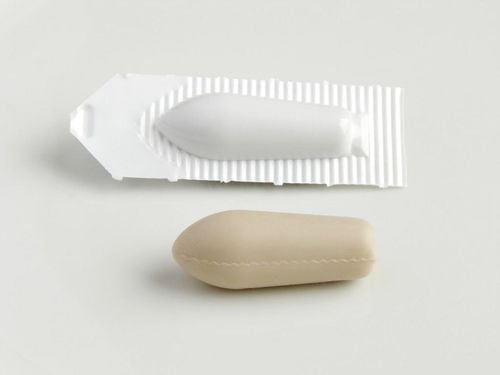Rhinathiol has a main active ingredient called Carbocisteine and other excipients with an appropriate amount. This medication affect respiratory tract with the function to treat respiratory tract disorders related to over secretion or increased viscosity, support treating otitis
1. What is Rhinathiol?
What is Rhinathiol? Rhinathiol has a main active ingredient called Carbocisteine and other excipients with an appropriate amount. This medication affect respiratory tract with the function to treat respiratory tract disorders related to over secretion or increased viscosity, support treating otitis
Rhinathiol is available under Syrup form or hard capsule, suitable for direct oral use.
1.1 Carbocisteine pharmacodynamic
Rhinathiol helps break down mucus, like Carbocisteine could be useful with patients with long-term respiratory condition like Chronic Obstructive Pulmonary Diseases (COPD)
Carbocisteine acts by making mucus (or phlegm) less thick and less sticky, therefore making it get removed via coughing easier.
Patients need to take medication on a daily basis and it would help alleviate if you have mild or severe chronic obstructive pulmonary diseases and usually have acute COPD or exacerbations.
1.2 Carbocisteine pharmacokinetics
- After oral administration, Carbocisteine quickly get absorbed and reach maximum plasma concentration in 2 hours
- Low bioavailability (<10%) due to intensive metabolism and first-pass effect though liver
- Average half-life approximately 2 hours
- Carbocysteine and metabolites mainly excreted through kidney
1.3 Carbocisteine’s effect
Carbocisteine dilutes phlegm by breaking disulfide bonds cross linking peptide chains of mucin, which increase viscosity of secretion. This helps decrease viscosity of mucus, changing the thickness and help patients expel phlegm easily.
2. Which condition can be treated with Rhinathiol?
Rhinathiol can be used to treat following conditions:
- Respiratory disorders involving over secretion or increased viscosity like acute bronchitis, chronic bronchitis. Bronchiectasis, asthmatic bronchitis or emphysema
- Ear, nose, throat conditions like otitis, sinusitis, rhinopharyngitis and reduce secretion before surgery
3. Use and Dosage of Rhinathiol
3.1 Rhinathiol dosage
- Rhinathiol is produced under the form of syrup, therefore it should be administered orally with or without water.
- For adults: 3 times daily, 1 tablespoon (~15ml) each time
- For children (5-12 years): 3 times daily, 1 teaspoon (~5ml) each time
- For children (2-5): 4 times daily, each ½ teaspoon
3.2 How to use Rhinathiol effectively
- When taking Rhinathiol, use dosing spoon provided with the medication for accurate measurement
- Rhinathiol should be taken minimally 30 minutes to avoid stomach irritation and interruption with bioavailability
- Store medication properly after use. During Rhinathiol use, if there is any abnormality about color, smell or taste, immediately stop.
- Strictly follow doctor’s prescription and guidance
- Do not extend Rhinathiol use without agreement from your doctor.
3.3 Rhinathiol Overdose management
Currently, there are no research or report about overdose while using Rhinathiol syrup. However, if there are any abnormal signs, immediately seek medical attention and come to the nearest healthcare institute.
4. Rhinathiol side effects
During use, Rhinathiol might cause certain side effects such as:
- Gastrointestinal Irritation: Stomachache, nausea, vomiting
- Skin symptoms: Itching, rashes
During Rhinathiol use, if patients have any abnormal symptoms, please contact your doctor for timely evaluation and management.
5. Rhinathiol Drug interaction
Rhinathiol might cause several drug interactions such as:
- Increase toxicity of Amoxicillin when used together
- Cimetidine reduce excretion of Carbocisteine via urine
To avoid adverse interactions, please follow Doctor’s guidance. Before using syrup Rhinathiol, you must inform healthcare professions about your current medications or supplement to prevent risks and avoid unwanted
interactions that might happen to you
6. Important notes on Rhinathiol use
6.1 Rhinathiol contraindication
- Do not use Rhinathiol if you are allergic to Carbocisteine or other components in the medication
- Do not use if you have history of hypersensitivity to mucolytic agents and other components in Rhinathiol
6.2 Warnings and precautions
- Use Rhinathiol under only prescription, do not use under no supervision
- Patients who have peptic ulcer should not take medication on an empty stomach to avoid irritation
- Rhinathiol contain saccharose, it should be cautious if administered for diabetic patients
- Children should only use Rhinathiol under supervision
- When using Rhinathiol, use a dosing spoon provided with the medication or other dosing equipment prescribed by the doctor. Seal after use
- Always check expiration date and product quality before use, discard if the syrup appears abnormal.
- Before buy or use, check expiration date to avoid consuming expired product that might deliver negative impact towards user’s health
- After using Rhinathiol, Seal the bottle after use to avoid contamination
- Rhinathiol should be administered as guided route and dosage to ensure best result
- Children under 2 should not use Rhinathiol
6.3 Caution for pregnancy and breastfeeding
Currently, there has not been any research or recommendation on the safety of Rhinathiol for pregnancy and breastfeeding women. Consult healthcare professionals or doctors before using medication on these populations
These are all information about Rhinathiol, patients should read the instructions carefully, consult doctors/pharmacists before use. Avoid self-medicating Rhinathiol for treatment at home since it might cause numerous unwanted side effects
Follow Vinmec Hospital’s website for further healthcare information, nutritional and beauty tips to protect yourself as well as your family.
To arrange an appointment, please call HOTLINE or make your reservation directly HERE. You may also download the MyVinmec app to schedule appointments faster and manage your reservations more conveniently.













